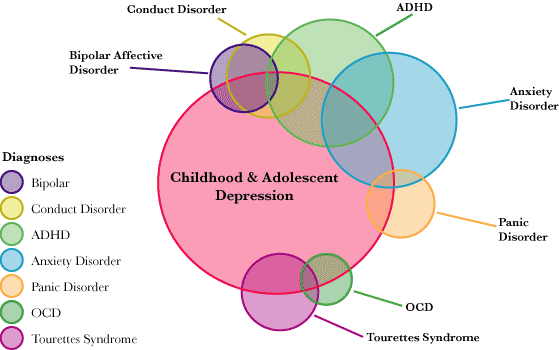NPDs are biological brain disorders that interfere with normal brain chemistry. Children often have multiple conditions. Each disorder manifests with overlapping symptoms of various presentations and severity (see diagram).

This diagram illustrates the complexity of the relationships between the various diagnoses for NPD. Symptoms such as inattention and lack of concentration are common to several diagnoses such as anxiety disorder, depression, OCD, bipolar disorder, ADHD/ADD, and other serious psychiatric illnesses. All of these disorders can coexist with a primary learning disability. The only way to accurately diagnose an NPD is through a comprehensive assessment. YOU CANNOT DIAGNOSE WITH A CHECKLIST.
NPDs Are No One’s Fault
They are not the result of poor parenting, poverty, or other interactions (Dr D.J. Jaffe). They are all caused by various biological changes in the chemistry of the brain. The biological nature of these disorders has been well-researched and medically recognized. Genetic factors may create a predisposition in some people and life events may trigger the onset of symptoms.
It is very important for parents and educational staff to recognize and accept the fact that, while the symptoms of these disorders may be behavioral, the causes are biological.
NPDs Can Be Treated
Treatment and management of NPDs have been compared to the treatment of diabetes; both are medical conditions. Treatment with medication rectifies the biological imbalance. No one would deny a diabetic their insulin but there is huge resistance to giving a child medication that will restore the balance of neurotransmitters.
These children will maximize their potential with specific and comprehensive treatment/management plans along with coordination and support at home and in school.
Diagnosis
Different biological disorders require different treatments and management approaches. Getting the correct diagnosis is absolutely critical.
Evaluation by a child and adolescent psychiatrist is appropriate for any child or adolescent with emotional or behavioral problems.
A developmental bio-psycho-social approach to the clinical assessment of children and adolescents is what families should seek while working with our mental health system.
What gets in the way?
Specialized training is required for the mental health professional to be able to identify and diagnose NPDs.
Societal resistance to labeling someone as having a neuropsychological disorder and the stigma that results often prevents children from receiving a proper evaluation, necessary diagnosis, treatment and management.
Inconsistency
The inconsistency of the child’s functioning often confuses concerned adults.
It is the nature of these disorders that:
- Children can appear to have a surprising lack of overt symptoms at school and yet be severely depressed.
- The child may appear fine at school and seriously struggle at home (i.e. smiling depression).
- Some children’s marks drop by 20% while others are able to maintain very high marks.
For more information on the Diagnosis
The Impact of NPDs on the Family
The isolation, anxiety, and sometimes demoralization of ordinary parents who are managing their best with challenging children is a heavy burden. A lack of knowledge of medical issues and unnecessary guilt can play havoc with parents’ sense of well-being and self-esteem. No one deserves such a burden: since disorders create invisible limitations, overt support and understanding are often not available to either children or their families (Pat Kirchner).
In order for the family to remain intact and well, support must be made available immediately to deal with the emotional stresses that come from day-to-day living with these children/adolescents as well as the added burden of stigma that is imposed by an ill-informed society.
Sources of Support in the Community
Use the sources of support available in the community:
- Child and adolescent mental health clinics.
- Support groups in the community specific to the child’s problem (i.e. ADHD, tourettes).
- Workshops or courses dealing with specific issues.
- Libraries/bookstores as a resource for information.
- Web sites for children and adolescents with NPDs.
- Religious leaders i.e. priest, minister, chaplain, rabbi etc.
- Family doctors and paediatricians.
Commitment
Children who have this disorder will do better when they have support and commitment from their parents and family:
What does this mean?
- Time commitment is required:
- Alone time (a date) with your child regularly (at least once a week). This doesn’t need to involve the spending of money.
- Time to take your child to therapy appointments.
- Time for you, your spouse and other children in the family to attend counselling to help you cope with the emotional fallout.
- Time to deal with crises that may arise.
- Time away from work.
- Time to maintain your marriage under the most trying circumstances.
- Time to keep communication lines open with the school.
- Understand that there is little time for couples and carving out a realistic way to spend even a few minutes together over a coffee is necessary to remain connected.
- Temporary changes in your personal, marriage, and family goals and plans may be required.
- A temporary reduction in your commitments outside the family may be required.
In the confrontation between the stream and the rock, the stream always wins…
not through strength, but through persistence. — H. Jackson Brown
Reviewed by M. Kodsi, M.D., Child, and Family Psychiatrist.
